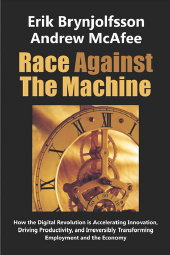How the Digital Revolution is Affecting Employment
Race Against the Machine, a new book by MIT Sloan’s Erik Brynjolfsson and Andrew McAfee argues that while digital automation is accelerating innovation and driving productivity, it’s also transforming what kinds of jobs are secure.
Topics

Brynjolfsson and McAfee’s new book was released this week
Race Against the Machine, a new book by MIT Sloan’s Erik Brynjolfsson, director of the MIT Center for Digital Business, and Andrew McAfee, principal research scientist at the center, has a long but descriptive subtitle: “How the Digital Revolution is Accelerating Innovation, Driving Productivity, and Irreversibly Transforming Employment and the Economy.”
The book is out in a Kindle edition.
A New York Times story notes that “The tone of alarm in their book is a departure for the pair, whose previous research has focused mainly on the benefits of advancing technology. Indeed, they were originally going to write a book titled, ‘The Digital Frontier,’ about the ‘cornucopia of innovation that is going on,’ Mr. McAfee said. Yet as the employment picture failed to brighten in the last two years, the two changed course to examine technology’s role in the jobless recovery.”
The impact of digital technologies on employment is not well understood or fully appreciated, the authors write in their introduction. “When people talk about jobs in America today, they talk about cyclicality, outsourcing and off-shoring, taxes and regulation, and the wisdom and efficacy of different kinds of stimulus. We don’t doubt the importance of all these factors. The economy is a complex, multifaceted entity. But there has been relatively little talk about role of acceleration of technology.”
The Times notes that technology has always displaced work, but that the authors see something new in the breadth of displacement:
In 1930, the economist John Maynard Keynes warned of a “new disease” that he termed “technological unemployment,” the inability of the economy to create new jobs faster than jobs were lost to automation. But Mr. Brynjolfsson and Mr. McAfee argue that the pace of automation has picked up in recent years because of a combination of technologies including robotics, numerically controlled machines, computerized inventory control, voice recognition and online commerce.
Faster, cheaper computers and increasingly clever software, the authors say, are giving machines capabilities that were once thought to be distinctively human, like understanding speech, translating from one language to another and recognizing patterns. So automation is rapidly moving beyond factories to jobs in call centers, marketing and sales — parts of the services sector, which provides most jobs in the economy.

Comments (3)
L’entreprise de demain [#e20] – libérée, jusqu’où ? « InfGov's Blog | Claude Super
Do apps create jobs? Discussing the evidence « Benchmarking e-government in web 2.0
cal.batz